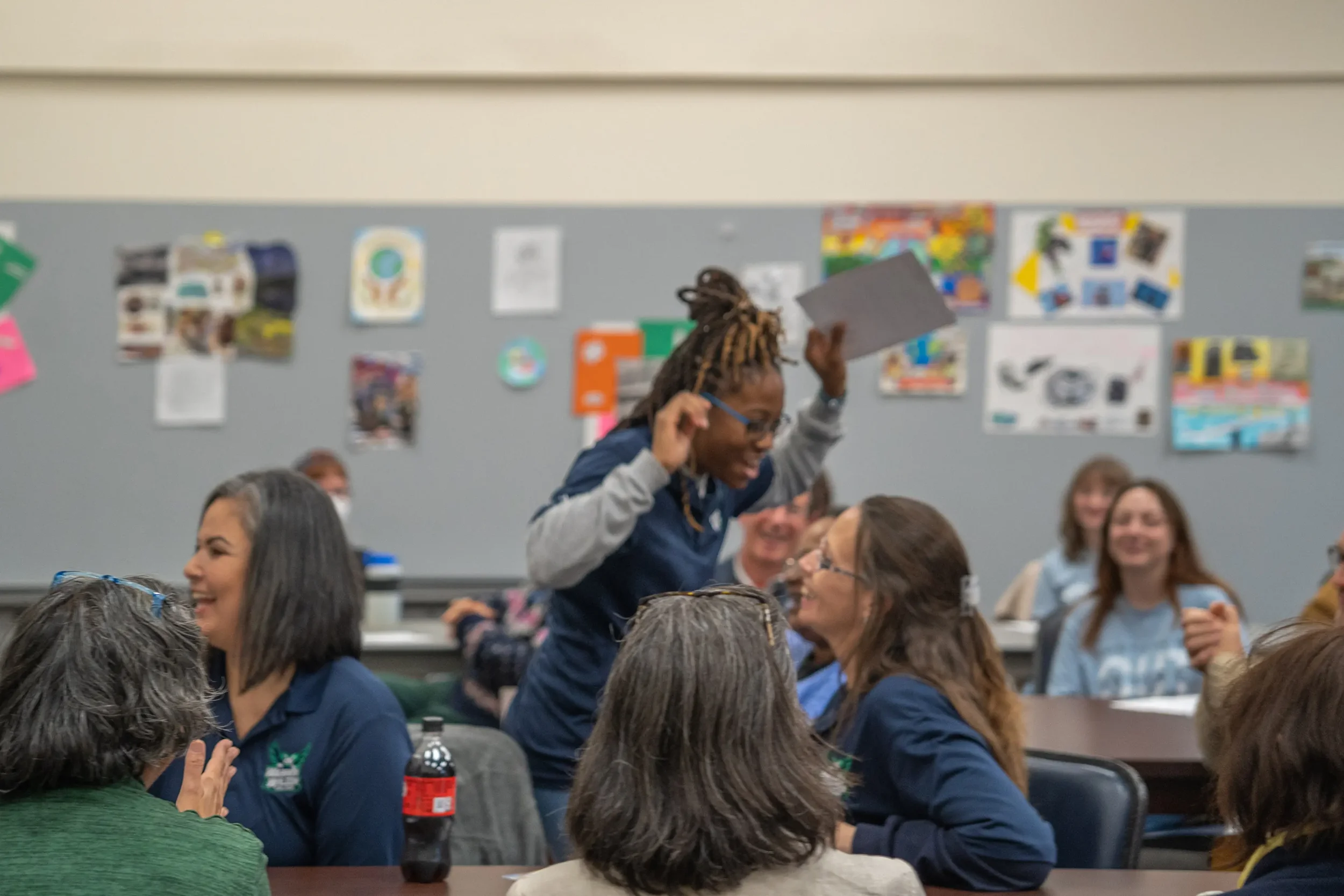Inside Out Is Back Again
Ryleigh Johnson | October 7, 2025
Inside Out students from Warren Wilson College (WWC) and the Western Correctional Center for Women celebrate their class graduation in Swannanoa, N.C. (Sarah Puterbaugh/Warren Wilson College)
The Inside Out program at Warren Wilson College (WWC) will return for the spring of 2026. The only program of its kind in North Carolina, Inside Out brings WWC students into the nearby Western Correctional Center for Women to be taught subjects including psychology, sociology and philosophy alongside incarcerated women.
Inside Out classes were paused in 2024 following Hurricane Helene and have faced challenges resuming due to the expiration of the grant that served as the program’s main source of funding. Lucy Lawrence, chair of the social work department and director of Inside Out, put forth a new program proposal to the president’s cabinet in May. She was able to secure a verbal funding agreement for the next two semesters with the North Carolina Department of Adult Corrections (NCDAC), which would allow the program to continue at WWC.
“The state values our program because of how it complements the experience at Western Correctional...” Lawrence said. “They also value that we are offering undergraduate liberal arts, because that kind of thinking and the kind of learning community that we develop through Inside Out really helps build social capital, as well as helping [the women] with or supporting their critical thinking development [and] soft skills that work and facilitate successful reentry.”
Inside Out has traditionally offered two classes per semester at WWC, but the only course for the spring of 2026 will be Introduction to Philosophy, taught by public humanities department chair and associate professor of philosophy Jay Miller. Lawrence is hopeful that by next fall, there will be enough resources to support two classes.
Students, like sophomore social work major Ellery Rather, were disappointed last spring to discover that the Inside Out courses slated to be taught this fall were cancelled. Rather had hoped to take Intercultural Communication, a class required for her major, as an Inside Out course. She believes that taking the class with incarcerated women would have significantly broadened the range of perspectives represented.
“I think that in prison, there is a diversity of experience that is not seen in your average college class,” Rather said. “Given what we know about people that experience incarceration, there might be more class diversity or racial diversity. I completed a social work relevant internship over the summer in an Oregon Youth Authority treatment facility for adjudicated boys, and I can definitely speak to the importance of my work with that population, in terms of cultivating empathy and developing my skills as a social worker.”
Rather also noted that this work in the Oregon Youth Authority treatment facility, which she feels has strong parallels to the prison system, was deeply essential to realizing the ways she had been socialized to accept the punishment model of the American carceral system.
“Even the slightest amount of exposure [to the carceral system], I think, will reveal to people the punitive nature of our justice system, and prompt them to realize how desensitized they are to that,” Rather said. “It is undoubtedly part of a system of dominance and hegemony in our culture. I think that it would be a shame to leave a Warren Wilson education without having that access to that realization...When I was working with adjudicated youth this summer, [I realized that] there are ugly thoughts that you think, or that I found myself thinking, that were a direct result of how society views prison. If a youth was giving me a hard time or they were acting out, there was this voice inside of me that was like, ‘Well, if you don't want to go with how things are around here, then you could just be rotting in jail. That's what you actually deserve.’ Isn't that such an ugly thing to speak out loud? I think that it's something important for our student body to consider, and for everybody to have a reckoning with.”
While Introduction to Philosophy is not a requirement for Rather, she is considering taking the course simply for the experience of learning alongside incarcerated women.
“I don't really have a huge interest in taking a philosophy course, but I would, given that it would be in the context of Inside Out,” Rather said.
A new hurdle the program faces is a requirement from the WWC administration that Inside Out classes be taught as an overload, or in addition to the number of classes a professor would normally be required to teach. While teaching an overload does offer faculty the opportunity to make extra money, it can also present logistical issues for professors who might not have time in their schedules for an additional class. That strain, on top of the unique challenges of teaching within a prison, like having to adhere to the facility’s schedule and educating without any access to technology, can be a deterrent to potential instructors.
For the time being, WWC is reestablishing a presence at the Western Correctional Center for Women by hosting book clubs led by faculty.
“We haven't been in the prison since Helene,” Lawrence said. “We still have a tiny bit of money left over from our previous grant, so we are offering four book clubs for women at the prison. All of the faculty who are doing it are doing it as volunteers. The purpose of that is to familiarize and re-familiarize [the] women who are there with Inside Out.”
Inside Out will be hosting an interest meeting and information session on Monday, Oct. 20, at 5:30 p.m. in Boon 210. Students can expect to hear about the history of the program at WWC and further details about the philosophy class being offered. Applications for the program, which open on Oct. 21, can be found on the WWC website.


